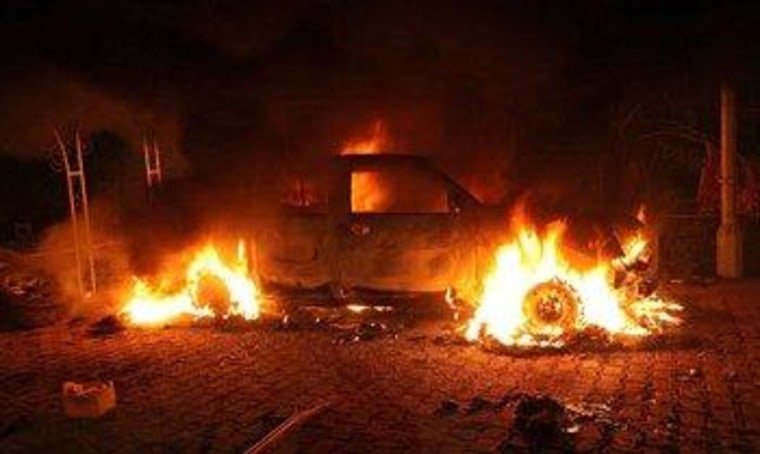A month ago, an attack on the U.S. consulate in Benghazi left four Americans dead, and Mitt Romney immediately tried to exploit the crisis for partisan gain. The effort backfired and even many on the right condemned the candidate's cravenness.
Though the incident left Romney hesitant to pursue Benghazi as a line of attack, the Republican again went on the offensive in last week's debate. Again, Romney's offensive backfired and left him looking rather ridiculous.
And on the eve of his third and final debate with President Obama, this time focused primarily on foreign policy, Romney very likely hoped to have one more chance to use Benghazi to undermine the president's standing on national security. Over the weekend, however, the Republican's entire line of criticism started to unravel.
The Romney campaign may have misfired with its suggestion that statements by President Obama and U.N. Ambassador Susan Rice about the Benghazi attack last month weren't supported by intelligence, according to documents provided by a senior U.S. intelligence official."Talking points" prepared by the CIA on Sept. 15, the same day that Rice taped three television appearances, support her description of the Sept. 11 attack on the U.S. Consulate as a reaction to Arab anger about an anti-Muslim video prepared in the United States. According to the CIA account, "The currently available information suggests that the demonstrations in Benghazi were spontaneously inspired by the protests at the U.S. Embassy in Cairo and evolved into a direct assault against the U.S. Consulate and subsequently its annex. There are indications that extremists participated in the violent demonstrations."
The L.A. Times also reported over the weekend that the best available evidence still suggests the administration's early assessment was correct: the attack apparently wasn't pre-planned. A U.S. official explained that most of the evidence suggests that "the attackers launched their assault opportunistically after they learned about the violence at the U.S. Embassy in Cairo" earlier that day.
For weeks, the Romney campaign has pushed a fairly specific line to the media: the Obama administration deliberately misled the public, falsely claiming the violence was related to the online video, when it was actually an attack carried out by al Qaeda. The latest information suggests the Romney campaign had the entire story backwards.
There's a larger point to also keep in mind.
It matters, of course, that the Obama administration told the truth and the Romney campaign did not. But I'm also struck by the extensive sourcing that's served as the basis for several news reports over the last few days.
At a certain level, what we may very well be witnessing are intelligence officials intervening in the political discourse to set the record straight. Romney aides, with no evidence, have been aggressively telling reporters for weeks that Obama orchestrated an elaborate "cover up" for reasons that have never been entirely clear. Now the intelligence community is providing materials and information that, in effect, tell journalists and the public, "Team Romney's full of it."
If you're getting the feeling that intelligence officials trust Obama more than Romney, we're thinking along the same lines.
On a related note, Kevin Drum had a terrific Q&A on the Benghazi story over the weekend. It's highly recommended.
